Project: Analyzing the Dynamics of a Double Pendulum System
VerifiedAdded on 2020/04/21
|9
|396
|259
Project
AI Summary
This project analyzes the dynamics of a double pendulum system, covering various aspects such as deriving equations of motion, determining natural frequencies and mode shapes, and analyzing harmonic motion. The solution includes the derivation of equations for two masses in the horizontal direction, the use of characteristic equations, and the calculation of amplitude ratios. Additionally, the assignment explores the concept of operating speed and its impact on the system's behavior, as well as the determination of steady-state amplitudes. The solution uses the concepts of mass and stiffness matrices to represent the system and determine its response to external forces. Overall, the project provides a comprehensive analysis of the double pendulum system, including the application of various engineering principles to understand its dynamic behavior under different conditions.
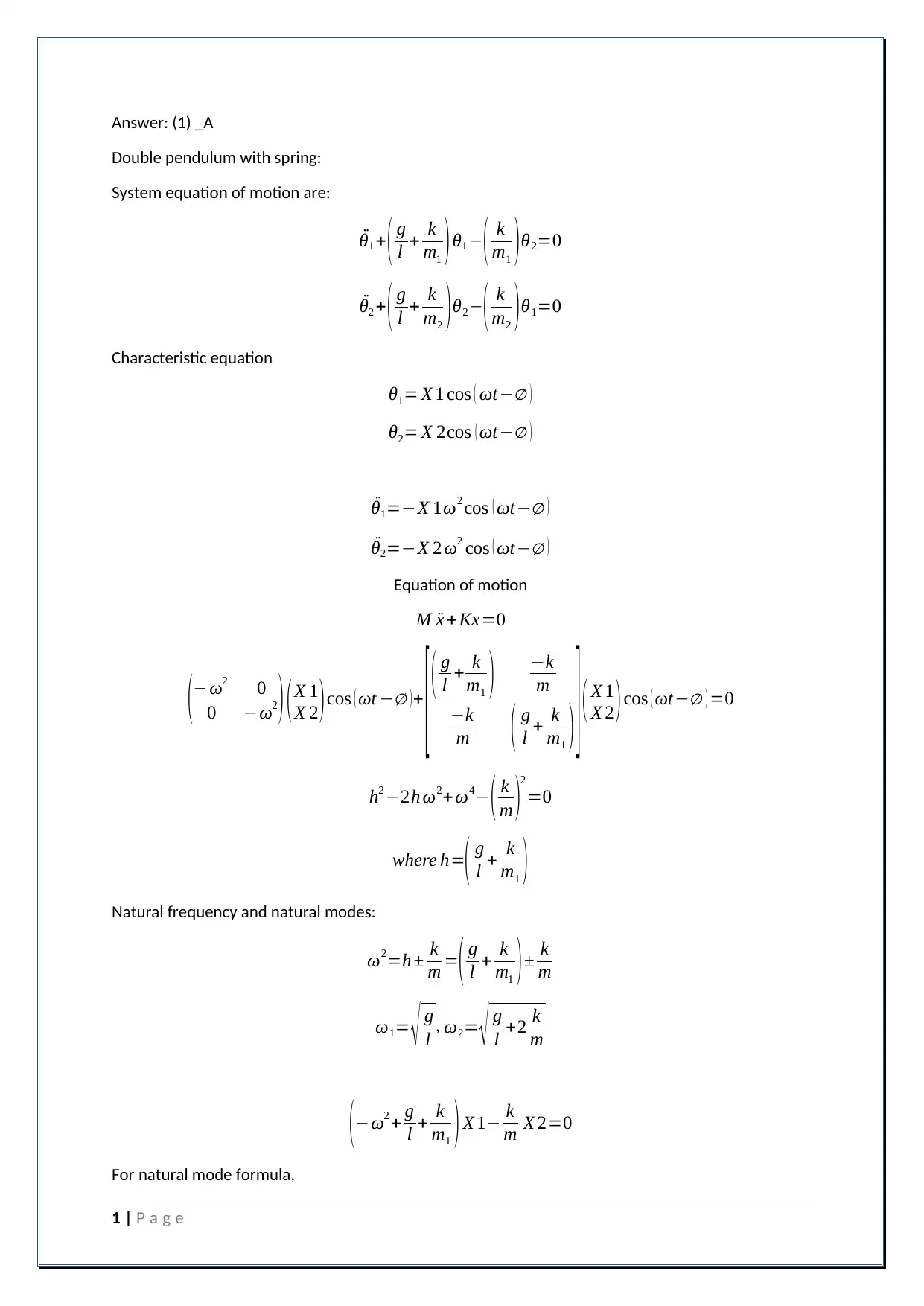
Answer: (1) _A
Double pendulum with spring:
System equation of motion are:
¨θ1 + ( g
l + k
m1 )θ1 −
( k
m1 )θ2=0
¨θ2 + ( g
l + k
m2 ) θ2−
( k
m2 ) θ1=0
Characteristic equation
θ1= X 1 cos ( ωt−∅ )
θ2= X 2cos ( ωt−∅ )
¨θ1=−X 1ω2 cos ( ωt−∅ )
¨θ2=−X 2 ω2 cos ( ωt−∅ )
Equation of motion
M ¨x + Kx=0
(−ω2 0
0 −ω2 ) (X 1
X 2 )cos ( ωt −∅ )+
[ ( g
l + k
m1 ) −k
m
−k
m ( g
l + k
m1 ) ] ( X 1
X 2 )cos ( ωt−∅ ) =0
h2 −2h ω2+ω4− ( k
m )2
=0
where h=
( g
l + k
m1 )
Natural frequency and natural modes:
ω2=h ± k
m =( g
l + k
m1 )± k
m
ω1= √ g
l , ω2= √ g
l +2 k
m
(−ω2 + g
l + k
m1 ) X 1− k
m X 2=0
For natural mode formula,
1 | P a g e
Double pendulum with spring:
System equation of motion are:
¨θ1 + ( g
l + k
m1 )θ1 −
( k
m1 )θ2=0
¨θ2 + ( g
l + k
m2 ) θ2−
( k
m2 ) θ1=0
Characteristic equation
θ1= X 1 cos ( ωt−∅ )
θ2= X 2cos ( ωt−∅ )
¨θ1=−X 1ω2 cos ( ωt−∅ )
¨θ2=−X 2 ω2 cos ( ωt−∅ )
Equation of motion
M ¨x + Kx=0
(−ω2 0
0 −ω2 ) (X 1
X 2 )cos ( ωt −∅ )+
[ ( g
l + k
m1 ) −k
m
−k
m ( g
l + k
m1 ) ] ( X 1
X 2 )cos ( ωt−∅ ) =0
h2 −2h ω2+ω4− ( k
m )2
=0
where h=
( g
l + k
m1 )
Natural frequency and natural modes:
ω2=h ± k
m =( g
l + k
m1 )± k
m
ω1= √ g
l , ω2= √ g
l +2 k
m
(−ω2 + g
l + k
m1 ) X 1− k
m X 2=0
For natural mode formula,
1 | P a g e
Paraphrase This Document
Need a fresh take? Get an instant paraphrase of this document with our AI Paraphraser
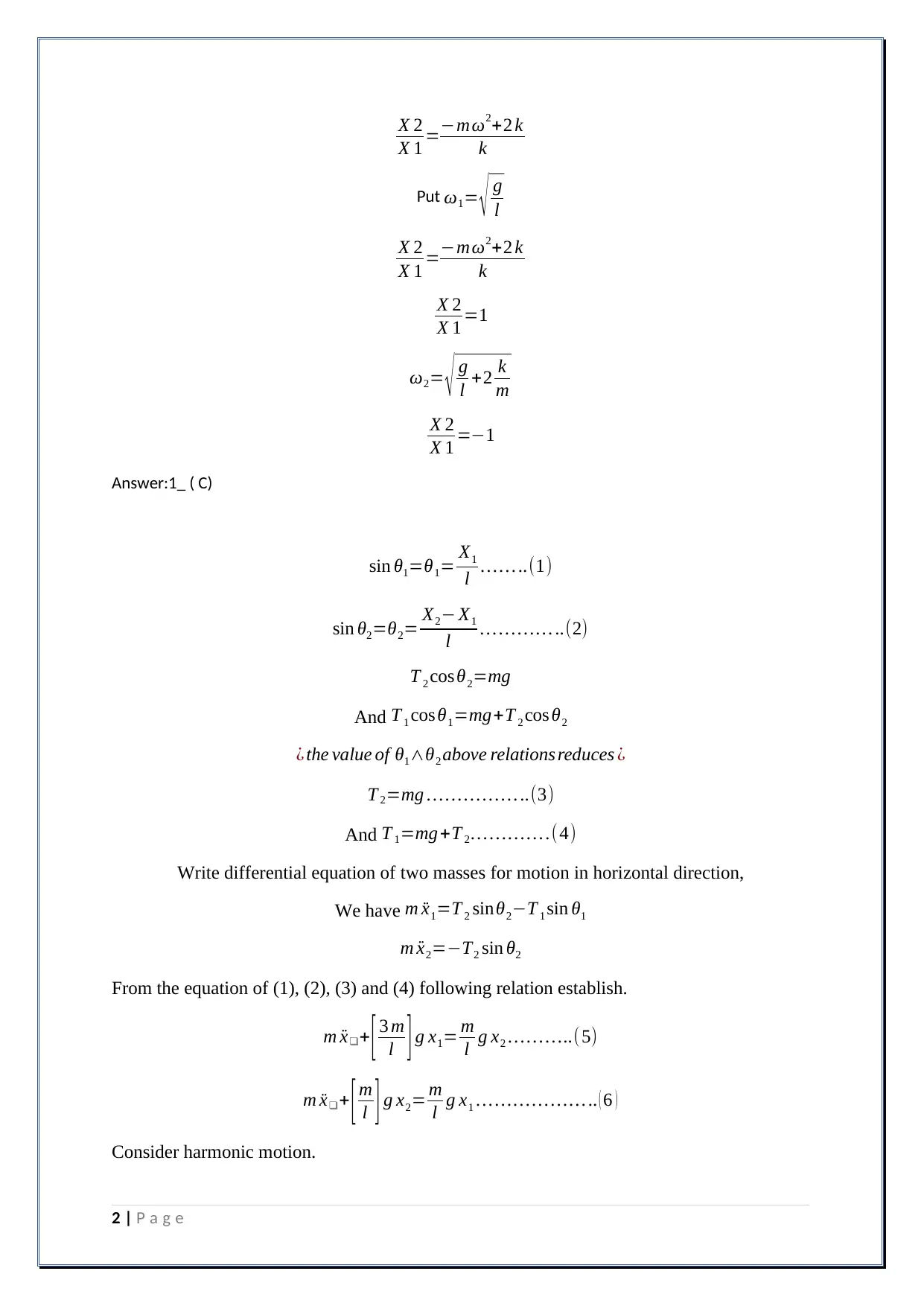
X 2
X 1 =−mω2+2 k
k
Put ω1= √ g
l
X 2
X 1 =−mω2+2 k
k
X 2
X 1 =1
ω2= √ g
l +2 k
m
X 2
X 1 =−1
Answer:1_ ( C)
sin θ1=θ1= X1
l … … ..(1)
sin θ2=θ2= X2− X1
l … … … … ..(2)
T 2 cosθ2=mg
And T 1 cos θ1=mg+T 2 cos θ2
¿ the value of θ1∧θ2 above relations reduces ¿
T 2=mg … … … … … ..(3)
And T 1=mg+T 2 … … … … .(4)
Write differential equation of two masses for motion in horizontal direction,
We have m ¨x1=T 2 sinθ2−T 1 sin θ1
m ¨x2=−T2 sin θ2
From the equation of (1), (2), (3) and (4) following relation establish.
m ¨x❑+ [ 3 m
l ] g x1= m
l g x2 … … …..(5)
m ¨x❑+ [ m
l ] g x2= m
l g x1 … … … … … … .. ( 6 )
Consider harmonic motion.
2 | P a g e
X 1 =−mω2+2 k
k
Put ω1= √ g
l
X 2
X 1 =−mω2+2 k
k
X 2
X 1 =1
ω2= √ g
l +2 k
m
X 2
X 1 =−1
Answer:1_ ( C)
sin θ1=θ1= X1
l … … ..(1)
sin θ2=θ2= X2− X1
l … … … … ..(2)
T 2 cosθ2=mg
And T 1 cos θ1=mg+T 2 cos θ2
¿ the value of θ1∧θ2 above relations reduces ¿
T 2=mg … … … … … ..(3)
And T 1=mg+T 2 … … … … .(4)
Write differential equation of two masses for motion in horizontal direction,
We have m ¨x1=T 2 sinθ2−T 1 sin θ1
m ¨x2=−T2 sin θ2
From the equation of (1), (2), (3) and (4) following relation establish.
m ¨x❑+ [ 3 m
l ] g x1= m
l g x2 … … …..(5)
m ¨x❑+ [ m
l ] g x2= m
l g x1 … … … … … … .. ( 6 )
Consider harmonic motion.
2 | P a g e
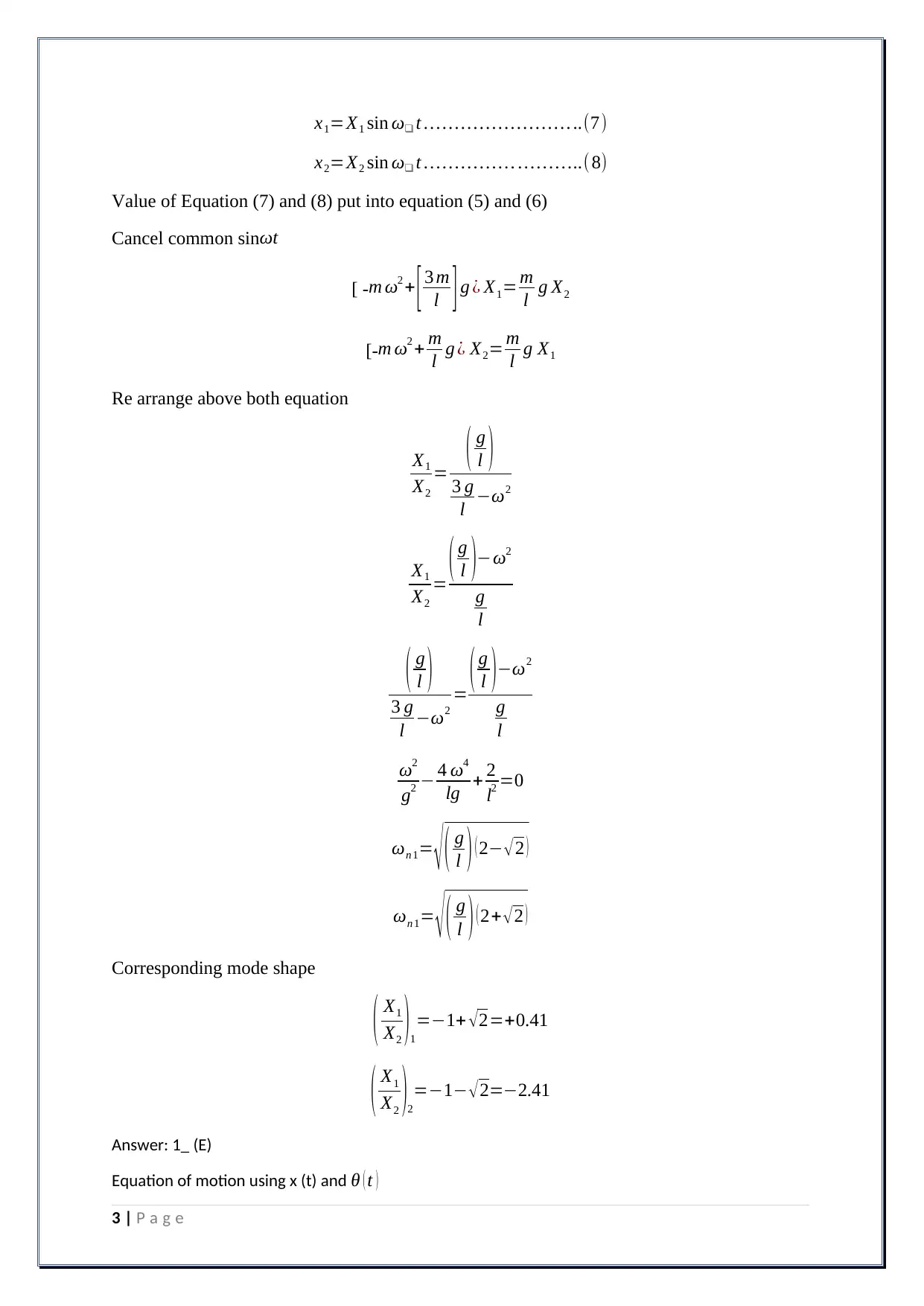
x1=X1 sin ω❑ t … … … … … … … … ..(7)
x2=X2 sin ω❑ t … … … … … … … …..( 8)
Value of Equation (7) and (8) put into equation (5) and (6)
Cancel common sinωt
[ -m ω2 + [ 3 m
l ] g ¿ X1= m
l g X2
[-m ω2 + m
l g ¿ X2= m
l g X1
Re arrange above both equation
X1
X2
= ( g
l )
3 g
l −ω2
X1
X2
= ( g
l )−ω2
g
l
( g
l )
3 g
l −ω2
= ( g
l )−ω2
g
l
ω2
g2 − 4 ω4
lg + 2
l2 =0
ωn 1= √ ( g
l ) ( 2− √2 )
ωn 1= √ ( g
l ) ( 2+ √2 )
Corresponding mode shape
( X1
X2 )1
=−1+ √2=+0.41
( X1
X2 )2
=−1− √ 2=−2.41
Answer: 1_ (E)
Equation of motion using x (t) and θ ( t )
3 | P a g e
x2=X2 sin ω❑ t … … … … … … … …..( 8)
Value of Equation (7) and (8) put into equation (5) and (6)
Cancel common sinωt
[ -m ω2 + [ 3 m
l ] g ¿ X1= m
l g X2
[-m ω2 + m
l g ¿ X2= m
l g X1
Re arrange above both equation
X1
X2
= ( g
l )
3 g
l −ω2
X1
X2
= ( g
l )−ω2
g
l
( g
l )
3 g
l −ω2
= ( g
l )−ω2
g
l
ω2
g2 − 4 ω4
lg + 2
l2 =0
ωn 1= √ ( g
l ) ( 2− √2 )
ωn 1= √ ( g
l ) ( 2+ √2 )
Corresponding mode shape
( X1
X2 )1
=−1+ √2=+0.41
( X1
X2 )2
=−1− √ 2=−2.41
Answer: 1_ (E)
Equation of motion using x (t) and θ ( t )
3 | P a g e
⊘ This is a preview!⊘
Do you want full access?
Subscribe today to unlock all pages.

Trusted by 1+ million students worldwide
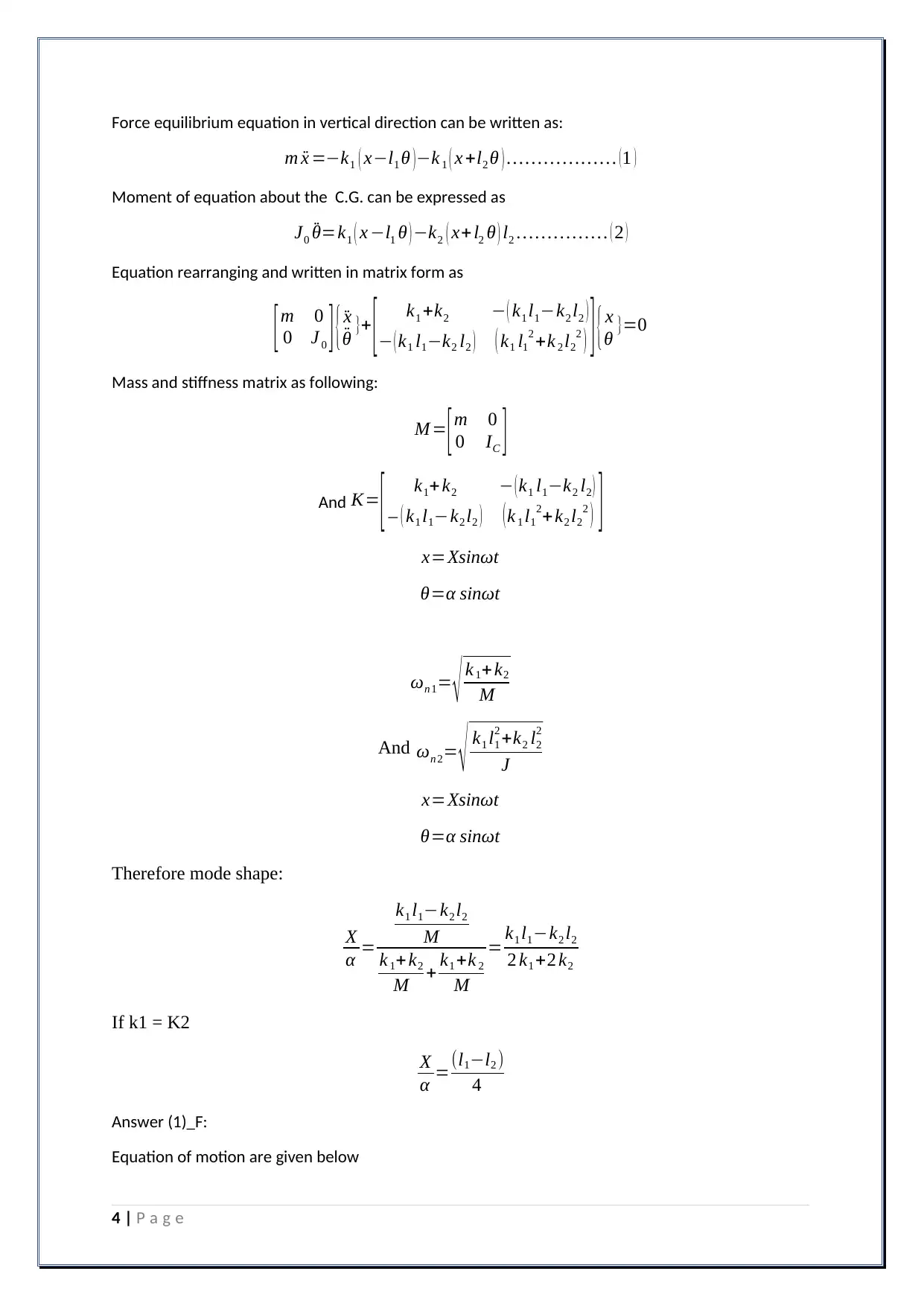
Force equilibrium equation in vertical direction can be written as:
m ¨x =−k1 ( x−l1 θ ) −k 1 ( x +l2 θ ) … … … …… … ( 1 )
Moment of equation about the C.G. can be expressed as
J0 ¨θ=k1 ( x −l1 θ ) −k2 ( x+l2 θ ) l2 … … … … … ( 2 )
Equation rearranging and written in matrix form as
[m 0
0 J 0 ] { ¨x
¨θ }+ [ k1 +k2 − ( k1 l1−k2 l2 )
− ( k1 l1−k2 l2 ) ( k1 l1
2 +k 2 l2
2 ) ] {x
θ }=0
Mass and stiffness matrix as following:
M = [ m 0
0 IC ]
And K= [ k1+ k2 − (k1 l1−k2 l2 )
– ( k1 l1−k2 l2 ) (k 1 l1
2+k2 l2
2 ) ]
x=Xsinωt
θ=α sinωt
ωn 1= √ k 1+ k2
M
And ωn 2= √ k1 l1
2 +k2 l2
2
J
x=Xsinωt
θ=α sinωt
Therefore mode shape:
X
α =
k1 l1−k2 l2
M
k 1+ k2
M + k1 +k 2
M
= k1 l1−k2 l2
2 k1 +2 k2
If k1 = K2
X
α =(l1−l2 )
4
Answer (1)_F:
Equation of motion are given below
4 | P a g e
m ¨x =−k1 ( x−l1 θ ) −k 1 ( x +l2 θ ) … … … …… … ( 1 )
Moment of equation about the C.G. can be expressed as
J0 ¨θ=k1 ( x −l1 θ ) −k2 ( x+l2 θ ) l2 … … … … … ( 2 )
Equation rearranging and written in matrix form as
[m 0
0 J 0 ] { ¨x
¨θ }+ [ k1 +k2 − ( k1 l1−k2 l2 )
− ( k1 l1−k2 l2 ) ( k1 l1
2 +k 2 l2
2 ) ] {x
θ }=0
Mass and stiffness matrix as following:
M = [ m 0
0 IC ]
And K= [ k1+ k2 − (k1 l1−k2 l2 )
– ( k1 l1−k2 l2 ) (k 1 l1
2+k2 l2
2 ) ]
x=Xsinωt
θ=α sinωt
ωn 1= √ k 1+ k2
M
And ωn 2= √ k1 l1
2 +k2 l2
2
J
x=Xsinωt
θ=α sinωt
Therefore mode shape:
X
α =
k1 l1−k2 l2
M
k 1+ k2
M + k1 +k 2
M
= k1 l1−k2 l2
2 k1 +2 k2
If k1 = K2
X
α =(l1−l2 )
4
Answer (1)_F:
Equation of motion are given below
4 | P a g e
Paraphrase This Document
Need a fresh take? Get an instant paraphrase of this document with our AI Paraphraser
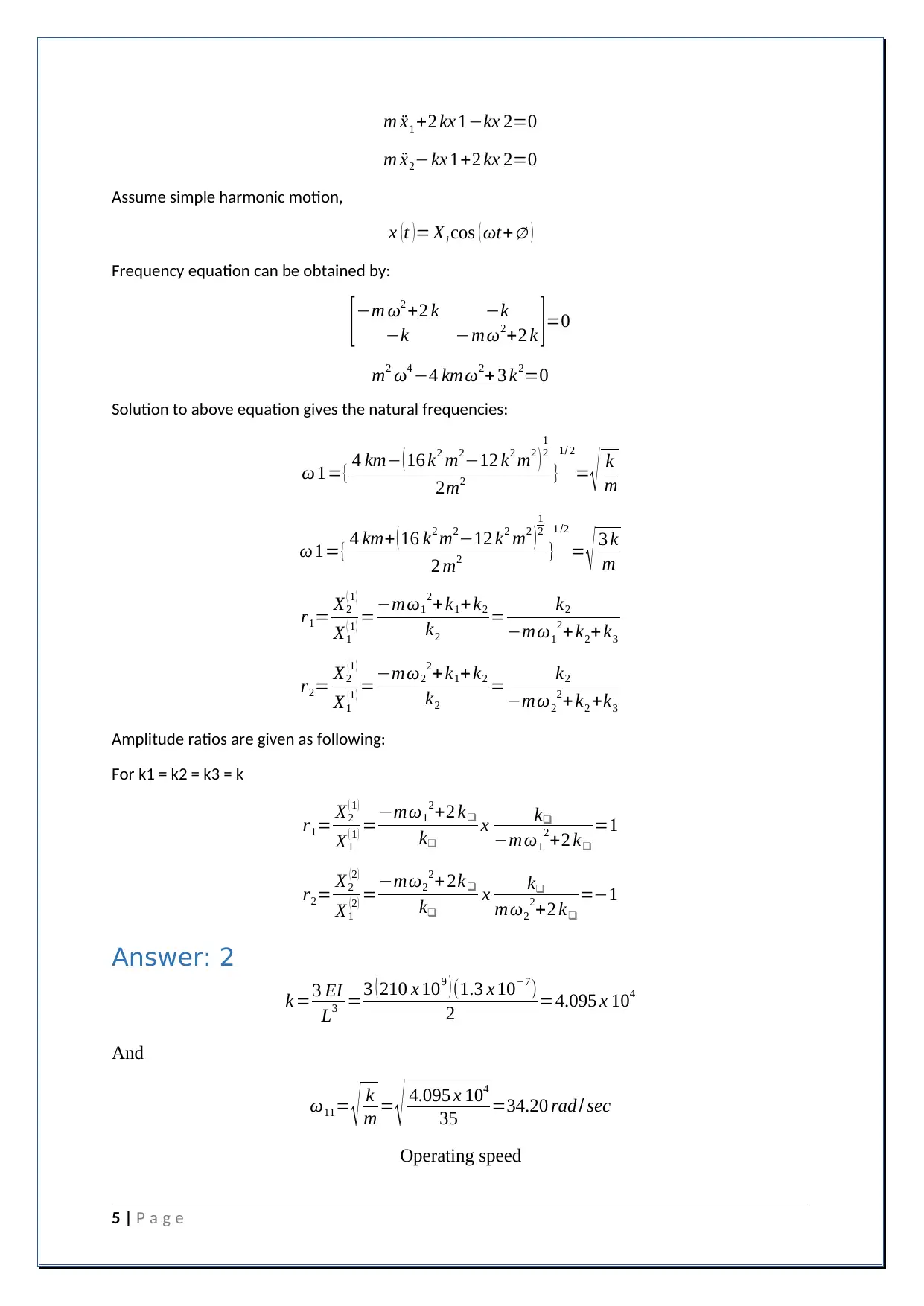
m ¨x1 +2 kx 1−kx 2=0
m ¨x2−kx 1+2 kx 2=0
Assume simple harmonic motion,
x (t )= Xi cos ( ωt+ ∅ )
Frequency equation can be obtained by:
[ −m ω2 +2 k −k
−k −mω2+2 k ] =0
m2 ω4 −4 kmω2+ 3 k2=0
Solution to above equation gives the natural frequencies:
ω 1={ 4 km− ( 16 k2 m2−12 k2 m2 )
1
2
2m2 }
1/ 2
= √ k
m
ω 1={ 4 km+ ( 16 k2 m2−12 k2 m2 )
1
2
2 m2 }
1 /2
= √ 3 k
m
r1= X2
( 1 )
X1
( 1 ) =−mω1
2+ k1+ k2
k2
= k2
−mω1
2+ k2+ k3
r2= X2
( 1 )
X1
( 1 ) =−mω2
2+ k1+ k2
k2
= k2
−mω2
2+ k2 +k3
Amplitude ratios are given as following:
For k1 = k2 = k3 = k
r1= X2
( 1 )
X1
( 1 ) =−mω1
2+2 k❑
k❑
x k❑
−mω1
2+2 k❑
=1
r2= X2
( 2 )
X1
( 2 ) =−mω2
2+ 2k❑
k❑
x k❑
mω2
2+2 k❑
=−1
Answer: 2
k =3 EI
L3 =3 ( 210 x 109 ) (1.3 x 10−7)
2 =4.095 x 104
And
ω11= √ k
m = √ 4.095 x 104
35 =34.20 rad / sec
Operating speed
5 | P a g e
m ¨x2−kx 1+2 kx 2=0
Assume simple harmonic motion,
x (t )= Xi cos ( ωt+ ∅ )
Frequency equation can be obtained by:
[ −m ω2 +2 k −k
−k −mω2+2 k ] =0
m2 ω4 −4 kmω2+ 3 k2=0
Solution to above equation gives the natural frequencies:
ω 1={ 4 km− ( 16 k2 m2−12 k2 m2 )
1
2
2m2 }
1/ 2
= √ k
m
ω 1={ 4 km+ ( 16 k2 m2−12 k2 m2 )
1
2
2 m2 }
1 /2
= √ 3 k
m
r1= X2
( 1 )
X1
( 1 ) =−mω1
2+ k1+ k2
k2
= k2
−mω1
2+ k2+ k3
r2= X2
( 1 )
X1
( 1 ) =−mω2
2+ k1+ k2
k2
= k2
−mω2
2+ k2 +k3
Amplitude ratios are given as following:
For k1 = k2 = k3 = k
r1= X2
( 1 )
X1
( 1 ) =−mω1
2+2 k❑
k❑
x k❑
−mω1
2+2 k❑
=1
r2= X2
( 2 )
X1
( 2 ) =−mω2
2+ 2k❑
k❑
x k❑
mω2
2+2 k❑
=−1
Answer: 2
k =3 EI
L3 =3 ( 210 x 109 ) (1.3 x 10−7)
2 =4.095 x 104
And
ω11= √ k
m = √ 4.095 x 104
35 =34.20 rad / sec
Operating speed
5 | P a g e
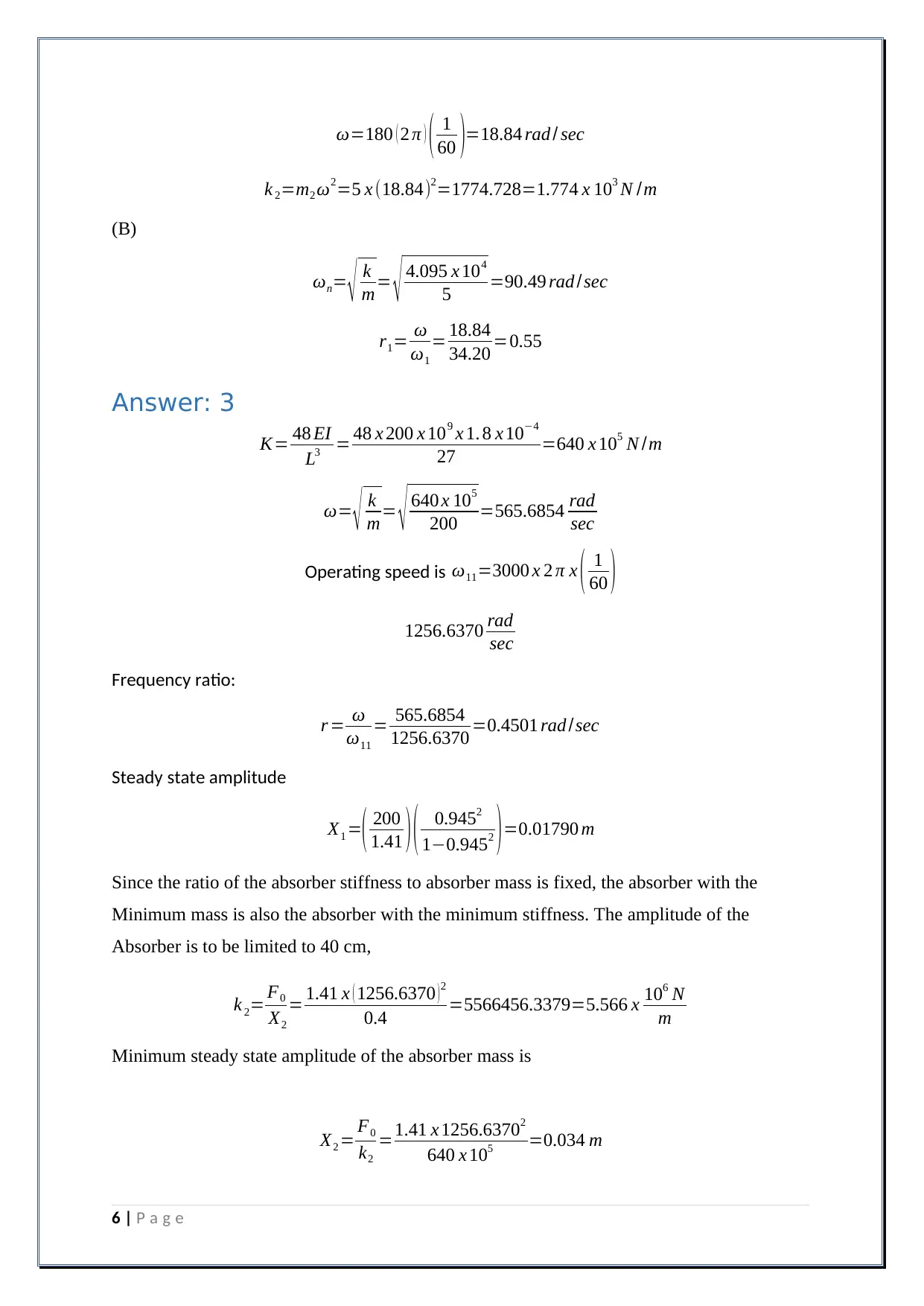
ω=180 ( 2 π ) ( 1
60 )=18.84 rad / sec
k 2=m2 ω2=5 x (18.84)2=1774.728=1.774 x 103 N /m
(B)
ωn= √ k
m= √ 4.095 x 104
5 =90.49 rad / sec
r1= ω
ω1
= 18.84
34.20 =0.55
Answer: 3
K= 48 EI
L3 = 48 x 200 x 109 x 1. 8 x 10−4
27 =640 x 105 N /m
ω= √ k
m= √ 640 x 105
200 =565.6854 rad
sec
Operating speed is ω11=3000 x 2 π x ( 1
60 )
1256.6370 rad
sec
Frequency ratio:
r = ω
ω11
= 565.6854
1256.6370 =0.4501 rad /sec
Steady state amplitude
X1 =( 200
1.41 ) ( 0.9452
1−0.9452 ) =0.01790 m
Since the ratio of the absorber stiffness to absorber mass is fixed, the absorber with the
Minimum mass is also the absorber with the minimum stiffness. The amplitude of the
Absorber is to be limited to 40 cm,
k 2= F0
X2
= 1.41 x ( 1256.6370 ) 2
0.4 =5566456.3379=5.566 x 106 N
m
Minimum steady state amplitude of the absorber mass is
X2 = F0
k2
=1.41 x 1256.63702
640 x 105 =0.034 m
6 | P a g e
60 )=18.84 rad / sec
k 2=m2 ω2=5 x (18.84)2=1774.728=1.774 x 103 N /m
(B)
ωn= √ k
m= √ 4.095 x 104
5 =90.49 rad / sec
r1= ω
ω1
= 18.84
34.20 =0.55
Answer: 3
K= 48 EI
L3 = 48 x 200 x 109 x 1. 8 x 10−4
27 =640 x 105 N /m
ω= √ k
m= √ 640 x 105
200 =565.6854 rad
sec
Operating speed is ω11=3000 x 2 π x ( 1
60 )
1256.6370 rad
sec
Frequency ratio:
r = ω
ω11
= 565.6854
1256.6370 =0.4501 rad /sec
Steady state amplitude
X1 =( 200
1.41 ) ( 0.9452
1−0.9452 ) =0.01790 m
Since the ratio of the absorber stiffness to absorber mass is fixed, the absorber with the
Minimum mass is also the absorber with the minimum stiffness. The amplitude of the
Absorber is to be limited to 40 cm,
k 2= F0
X2
= 1.41 x ( 1256.6370 ) 2
0.4 =5566456.3379=5.566 x 106 N
m
Minimum steady state amplitude of the absorber mass is
X2 = F0
k2
=1.41 x 1256.63702
640 x 105 =0.034 m
6 | P a g e
⊘ This is a preview!⊘
Do you want full access?
Subscribe today to unlock all pages.

Trusted by 1+ million students worldwide
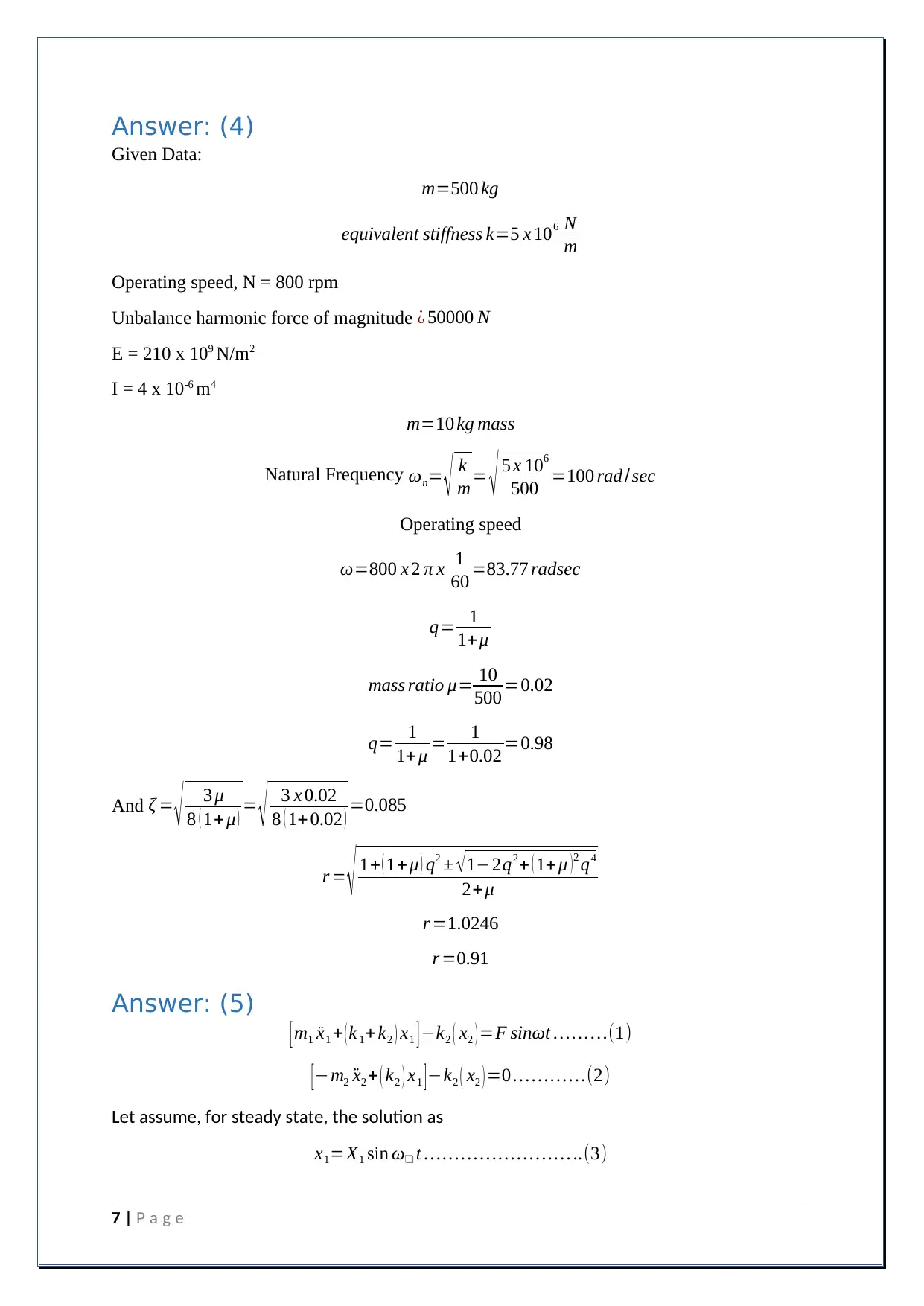
Answer: (4)
Given Data:
m=500 kg
equivalent stiffness k=5 x 106 N
m
Operating speed, N = 800 rpm
Unbalance harmonic force of magnitude ¿ 50000 N
E = 210 x 109 N/m2
I = 4 x 10-6 m4
m=10 kg mass
Natural Frequency ωn= √ k
m= √ 5 x 106
500 =100 rad /sec
Operating speed
ω=800 x 2 π x 1
60 =83.77 radsec
q= 1
1+μ
mass ratio μ= 10
500 =0.02
q= 1
1+ μ = 1
1+0.02 =0.98
And ζ = √ 3 μ
8 ( 1+ μ ) = √ 3 x 0.02
8 ( 1+ 0.02 ) =0.085
r = √ 1+ ( 1+ μ ) q2 ± √ 1−2q2+ ( 1+ μ ) 2 q4
2+ μ
r =1.0246
r =0.91
Answer: (5)
[ m1 ¨x1 + (k 1+ k2 ) x1 ] −k2 ( x2 ) =F sinωt …… …(1)
[−m2 ¨x2 + ( k2 ) x1 ]−k2 ( x2 ) =0 … … … …(2)
Let assume, for steady state, the solution as
x1=X1 sin ω❑ t … … … … … … … … ..(3)
7 | P a g e
Given Data:
m=500 kg
equivalent stiffness k=5 x 106 N
m
Operating speed, N = 800 rpm
Unbalance harmonic force of magnitude ¿ 50000 N
E = 210 x 109 N/m2
I = 4 x 10-6 m4
m=10 kg mass
Natural Frequency ωn= √ k
m= √ 5 x 106
500 =100 rad /sec
Operating speed
ω=800 x 2 π x 1
60 =83.77 radsec
q= 1
1+μ
mass ratio μ= 10
500 =0.02
q= 1
1+ μ = 1
1+0.02 =0.98
And ζ = √ 3 μ
8 ( 1+ μ ) = √ 3 x 0.02
8 ( 1+ 0.02 ) =0.085
r = √ 1+ ( 1+ μ ) q2 ± √ 1−2q2+ ( 1+ μ ) 2 q4
2+ μ
r =1.0246
r =0.91
Answer: (5)
[ m1 ¨x1 + (k 1+ k2 ) x1 ] −k2 ( x2 ) =F sinωt …… …(1)
[−m2 ¨x2 + ( k2 ) x1 ]−k2 ( x2 ) =0 … … … …(2)
Let assume, for steady state, the solution as
x1=X1 sin ω❑ t … … … … … … … … ..(3)
7 | P a g e
Paraphrase This Document
Need a fresh take? Get an instant paraphrase of this document with our AI Paraphraser
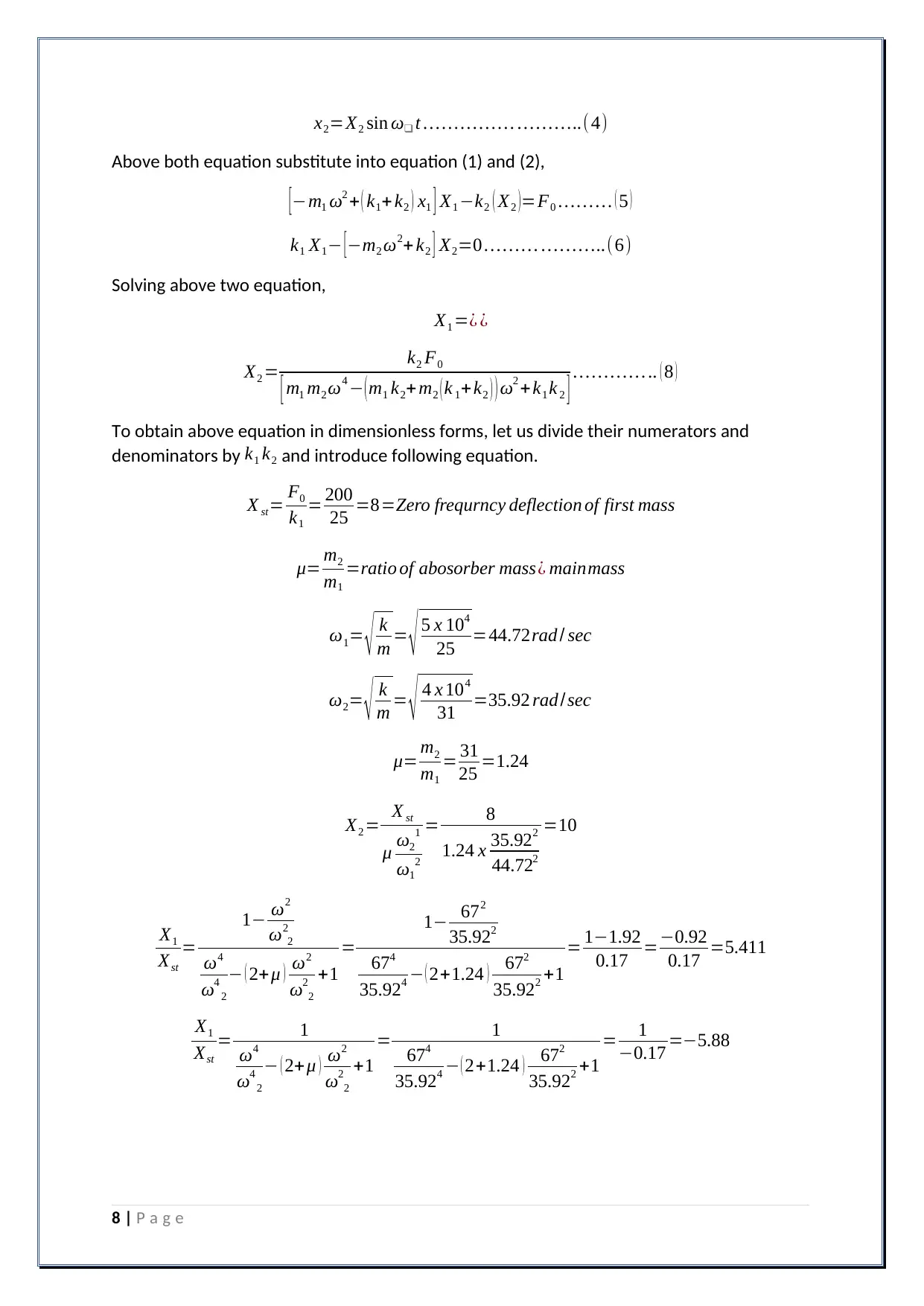
x2=X2 sin ω❑ t … … … … … … … …..( 4)
Above both equation substitute into equation (1) and (2),
[−m1 ω2 + ( k1+ k2 ) x1 ] X1 −k2 ( X2 )=F0 … … … ( 5 )
k1 X1− [−m2 ω2+ k2 ] X2=0 … … … … … …..(6)
Solving above two equation,
X1 =¿ ¿
X2 = k2 F0
[ m1 m2 ω4 − (m1 k2+m2 ( k 1+k2 ) ) ω2 +k1 k 2 ] … … … … .. ( 8 )
To obtain above equation in dimensionless forms, let us divide their numerators and
denominators by k1 k2 and introduce following equation.
X st= F0
k1
= 200
25 =8=Zero frequrncy deflection of first mass
μ= m2
m1
=ratio of abosorber mass¿ mainmass
ω1= √ k
m = √ 5 x 104
25 =44.72rad / sec
ω2= √ k
m = √ 4 x 104
31 =35.92 rad /sec
μ= m2
m1
= 31
25 =1.24
X2 = X st
μ ω2
1
ω1
2
= 8
1.24 x 35.922
44.722
=10
X1
Xst
=
1− ω2
ω2
2
ω4
ω4
2
− ( 2+ μ ) ω2
ω2
2
+1
=
1− 672
35.922
674
35.924 − ( 2+1.24 ) 672
35.922 +1
= 1−1.92
0.17 =−0.92
0.17 =5.411
X1
Xst
= 1
ω4
ω4
2
− ( 2+μ ) ω2
ω2
2
+1
= 1
674
35.924 − ( 2+1.24 ) 672
35.922 +1
= 1
−0.17 =−5.88
8 | P a g e
Above both equation substitute into equation (1) and (2),
[−m1 ω2 + ( k1+ k2 ) x1 ] X1 −k2 ( X2 )=F0 … … … ( 5 )
k1 X1− [−m2 ω2+ k2 ] X2=0 … … … … … …..(6)
Solving above two equation,
X1 =¿ ¿
X2 = k2 F0
[ m1 m2 ω4 − (m1 k2+m2 ( k 1+k2 ) ) ω2 +k1 k 2 ] … … … … .. ( 8 )
To obtain above equation in dimensionless forms, let us divide their numerators and
denominators by k1 k2 and introduce following equation.
X st= F0
k1
= 200
25 =8=Zero frequrncy deflection of first mass
μ= m2
m1
=ratio of abosorber mass¿ mainmass
ω1= √ k
m = √ 5 x 104
25 =44.72rad / sec
ω2= √ k
m = √ 4 x 104
31 =35.92 rad /sec
μ= m2
m1
= 31
25 =1.24
X2 = X st
μ ω2
1
ω1
2
= 8
1.24 x 35.922
44.722
=10
X1
Xst
=
1− ω2
ω2
2
ω4
ω4
2
− ( 2+ μ ) ω2
ω2
2
+1
=
1− 672
35.922
674
35.924 − ( 2+1.24 ) 672
35.922 +1
= 1−1.92
0.17 =−0.92
0.17 =5.411
X1
Xst
= 1
ω4
ω4
2
− ( 2+μ ) ω2
ω2
2
+1
= 1
674
35.924 − ( 2+1.24 ) 672
35.922 +1
= 1
−0.17 =−5.88
8 | P a g e
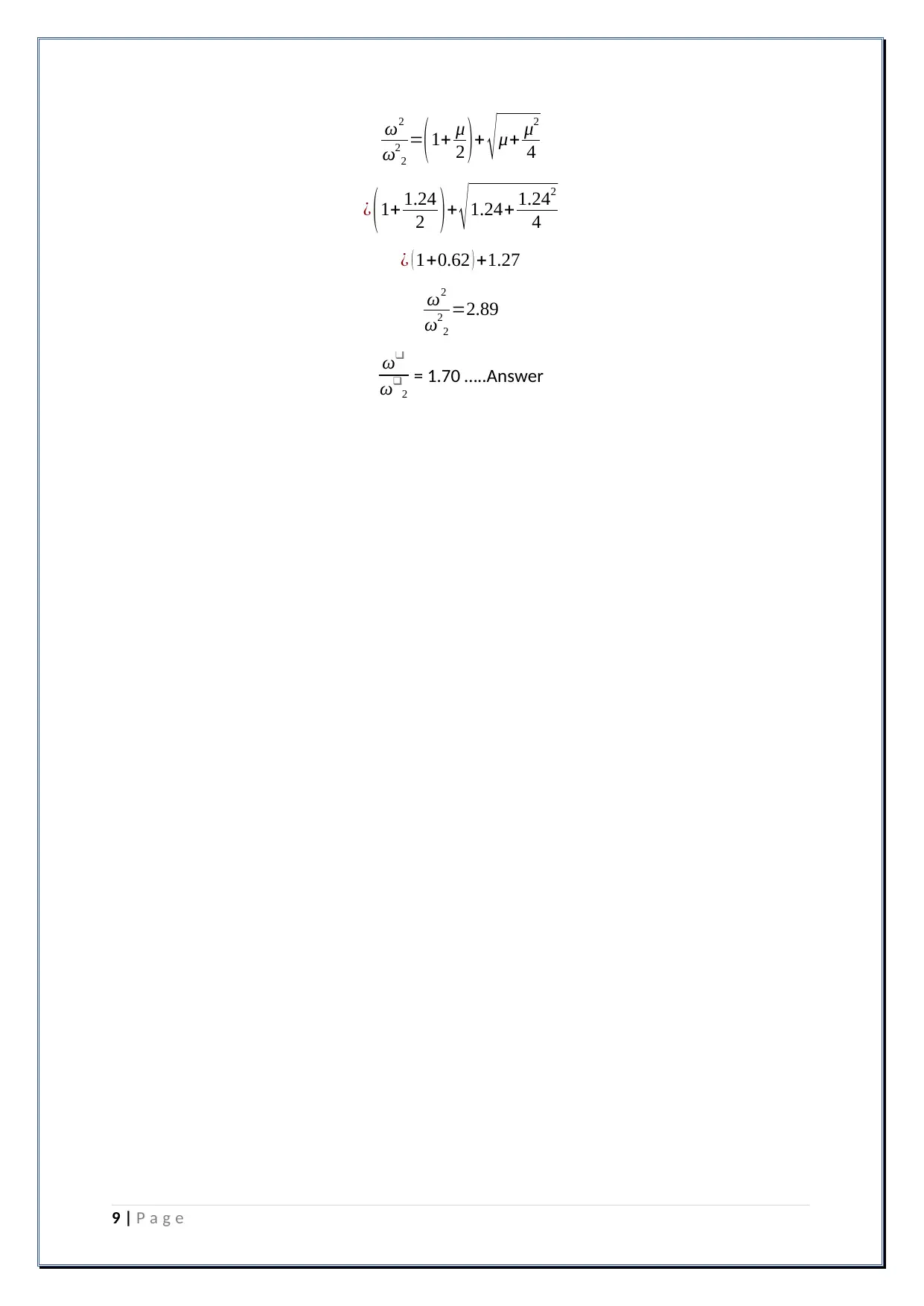
ω2
ω2
2
=(1+ μ
2 )+ √μ+ μ2
4
¿ ( 1+ 1.24
2 ) + √ 1.24+ 1.242
4
¿ ( 1+0.62 ) +1.27
ω2
ω2
2
=2.89
ω❑
ω❑
2
= 1.70 …..Answer
9 | P a g e
ω2
2
=(1+ μ
2 )+ √μ+ μ2
4
¿ ( 1+ 1.24
2 ) + √ 1.24+ 1.242
4
¿ ( 1+0.62 ) +1.27
ω2
ω2
2
=2.89
ω❑
ω❑
2
= 1.70 …..Answer
9 | P a g e
⊘ This is a preview!⊘
Do you want full access?
Subscribe today to unlock all pages.

Trusted by 1+ million students worldwide
1 out of 9
Related Documents
Your All-in-One AI-Powered Toolkit for Academic Success.
+13062052269
info@desklib.com
Available 24*7 on WhatsApp / Email
![[object Object]](/_next/static/media/star-bottom.7253800d.svg)
Unlock your academic potential
Copyright © 2020–2026 A2Z Services. All Rights Reserved. Developed and managed by ZUCOL.



